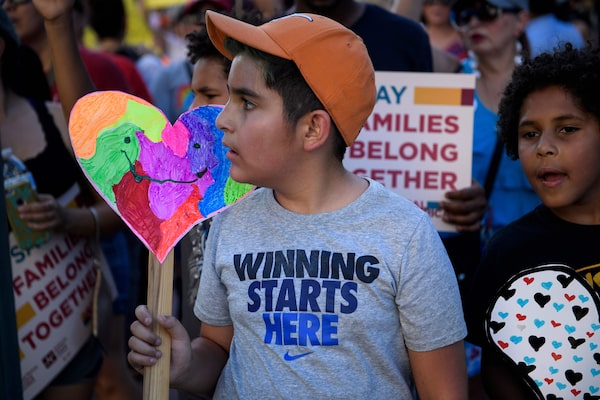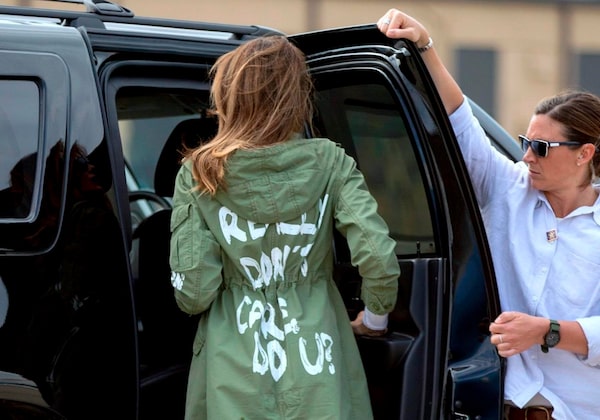
Children march during a rally in El Paso, Tex., to protest the separating of children from their parents.BRENDAN SMIALOWSKI/AFP/Getty Images
The Trump administration is preparing military bases to house up to 20,000 child migrants unaccompanied by parents amid mounting outrage over the treatment of minors by the U.S. immigration system.
Authorities, meanwhile, are struggling to enforce U.S. President Donald Trump’s edict to continue criminally charging all people who cross the border from Mexico illegally, but somehow ensure they are not separated from their children. In at least two Texas courthouses on Thursday, prosecutors simply dropped all criminal charges against migrants with children.
And the fate of an immigration bill – meant to provide a permanent fix to the family separation problem – remained in doubt, with a vote punted to next week and Congressional leaders uncertain whether it has enough support to pass.
Hanging in the balance are the lives of thousands of migrant children and infants – most of them from Central America – held in camps and enclosures along the border or dispersed to social agencies across the country, unsure when or if they will see their parents again.
The plan to house unaccompanied children on military bases, disclosed to Congress by the Department of Defence in a memo first reported on by the Washington Post, gives some indication of the magnitude of the problem. It would see children housed at defence facilities starting July 1 until the end of the year.
Explainer: What we know so far about Trump’s ‘zero-tolerance’ policy
It’s not clear if the children to be housed at bases are only those who arrived in the United States without their parents, or if it would also include those separated from their families.
More than 2,300 children were taken from their parents after Mr. Trump brought down a “zero tolerance” policy of hitting all migrants with criminal charges. On Wednesday, after an avalanche of international condemnation, he signed an executive order mandating families be kept together.
But on Thursday, the President insisted he wanted the criminal prosecutions to continue.
U.S. President Donald Trump said Thursday he was directing federal agencies to begin reuniting children and parents separated at the U.S.-Mexico border.
Reuters
“If you took zero tolerance away, you would be overrun as a country. You’d have millions of people pouring through our border,” he warned at a combative cabinet meeting. “They’d be getting their little belongings, unfortunately, and they would be heading up.”
Some U.S. officials, however, felt differently.
At a courtroom in McAllen, Tex., on Thursday, authorities unexpectedly decided not to bring forward 17 migrants they identified as “heads of household” for charges, public defender Marjorie Meyers said.
“As far as we can tell, there is no policy right now,” she told The Globe and Mail. “They don’t know what’s going on.”
It was a similar story in El Paso. Twenty migrants charged with illegally entering the country were set to plead guilty in court, but prosecutors suddenly dropped charges against the 19 migrants who have children, while proceeding with the prosecution of the one who did not, their lawyer, Vivek Grover, said.
“It appears that something came down the wire today: They’re taking the position that if there’s someone entering illegally with a child, they’re not prosecuting that case,” he said.
Mr. Grover said it was unclear whether his clients, who will now be processed through the regular immigration system, would be able to be reunited with their children. The government did, however, give them numbers to call to try to find out where their kids are.
The El Paso public defender’s office said a total of 23 cases were dismissed this morning and that no longer charging migrant parents is – at least for now – the policy of the authorities in West Texas.
Mr. Trump’s order is likely to be legally untenable: The Flores settlement, a court order that sets out rules for holding migrants in detention, mandates that children be released after 20 days. This means that if children are held with their parents as the parents go through the criminal-justice system, the children will either be separated from their families after 20 days or the Trump administration could face a barrage of lawsuits.
The Justice Department on Thursday launched a legal case to try to get the 20-day rule overturned. Mr. Trump is also looking to Congress to give the administration more power to hold families in indefinite detention and deport them faster.
A more conservative immigration bill, moved by Congressman Bob Goodlatte, went down to a 231 to 193 defeat on Thursday. Mr. Goodlatte’s bill had also mandated deep cuts to legal immigration and did not allow a path to citizenship for “Dreamers,” people brought into the country illegally as children.
The fate of a more moderate bill, negotiated by Speaker Paul Ryan and the White House, is uncertain. Originally scheduled for a vote Thursday, it has now been deferred to next week as the GOP tries to corral its fractious caucus. The legislation, which also cuts immigration and promises future funding for Mr. Trump’s border wall, is unlikely to get any support from Democrats.
Also in limbo was the fate of the children already separated from their parents. Mr. Trump’s edict does not mandate that they be reunited.
New York Mayor Bill Di Blasio, who led a group of mayors to protest at a federally run tent city in Tornillo, Tex., said he visited a social-services centre in East Harlem that was caring for 239 child migrants.
“The President retreated … but that has not solved the problem. These families are not reunified,” he said.
And immigrant advocates warned that even if Mr. Trump gets what he wants – the ability to indefinitely keep families in government custody together – it will not be humane. They called instead for non-dangerous migrants to be released pending immigration hearings.
“I don’t think anybody wants to see these little children spending years with their parents in detention,” Lee Gelernt, a lawyer with the American Civil Liberties Union, said in a call with reporters.

First Lady Melania Trump wore a coat with the words on the back “I really don’t care, do u?”Andrew Harnik/The Canadian Press
First Lady Melania Trump, meanwhile, made her own trip to Texas in a bid to contain the escalating public-relations damage to the White House. She visited a centre for child migrants in McAllen. But her visit was overshadowed by her choice of coat, a green jacket from Zara with a message in white lettering on the back: “I really don’t care do u?”
Explainer: Families separated, children detained: What we know so far about Trump’s ‘zero-tolerance’ policy
Editor’s note: An earlier version of this story included a report from the AP that said prosecutors had dropped the charges against 17 migrant parents in McAllen, Texas. This was removed as the charges simply did not proceed as scheduled.
 Adrian Morrow
Adrian Morrow Tamsin McMahon
Tamsin McMahon